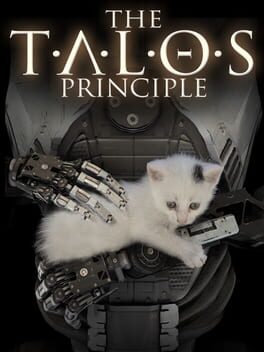Raidiancat
The Talos Principle 2014
Log Status
Played
Playing
Backlog
Wishlist
Rating
Time Played
--
Days in Journal
1 day
Last played
August 1, 2021
Platforms Played
The Talos Principle makes no pretenses about what it is. From the very start the world you are in is clearly artificial with objects glitching in and out. As soon as you grab an item it becomes clear that you are playing as a robot. The godly voice who guides you simply wants you to complete puzzles. The Talos principle is a very raw and content dense puzzle game. Every mechanic introduced is used frequently with other mechanics till the end of the game, and the game even makes end game puzzles which feature none of the unlocked items. Puzzles get dense as the game goes on with large spaces and many items. This is helped by the fact that most items are multi purpose and they all synergize well. So just because a door has a laser receptor on it doesn't always mean that you must shine a laser to open that door; using a jammer may be the better option. This avoids the problem of the puzzles being immediately solvable by just viewing the items at hand. The start of each puzzle features a purple force field that stops items from going in or out, but many of the hidden stars require the player to literally think outside the box and smuggle items in and out of puzzles. A few of the puzzles and many of stars have multiple solutions too due to how shockingly open the movement is in game.
On the surface The Talos principle has a pretty light story with Elohim chiming in far less frequently then say Glados, and that is because most of the story is revealed in optional text documents and discussions with the MLA. The game tries to merge the critical thinking of puzzle solving with its story by adding a heavy amount of philosophical texts to supplement the story lore. This is where the issues with the story come in. The Greek and Egyptian worlds all have texts relating to each regions philosophy, but the medieval area has very few texts dealing with medieval philosophy taking away the compare and contrast element the previous level has. The debates with the MLA feel too restrictive to come off as genuine philosophical debates. In the end the philosophy of The Talos principle feels a little too shallow like its conclusions about consciousness have little to do with the classical philosophy discussed earlier. Perhaps some more sources detailing the different opinions on the matter would have done the story better. I do like how the completionist ending is the worst one shows a nice commitment to the games story set up.
On the surface The Talos principle has a pretty light story with Elohim chiming in far less frequently then say Glados, and that is because most of the story is revealed in optional text documents and discussions with the MLA. The game tries to merge the critical thinking of puzzle solving with its story by adding a heavy amount of philosophical texts to supplement the story lore. This is where the issues with the story come in. The Greek and Egyptian worlds all have texts relating to each regions philosophy, but the medieval area has very few texts dealing with medieval philosophy taking away the compare and contrast element the previous level has. The debates with the MLA feel too restrictive to come off as genuine philosophical debates. In the end the philosophy of The Talos principle feels a little too shallow like its conclusions about consciousness have little to do with the classical philosophy discussed earlier. Perhaps some more sources detailing the different opinions on the matter would have done the story better. I do like how the completionist ending is the worst one shows a nice commitment to the games story set up.
